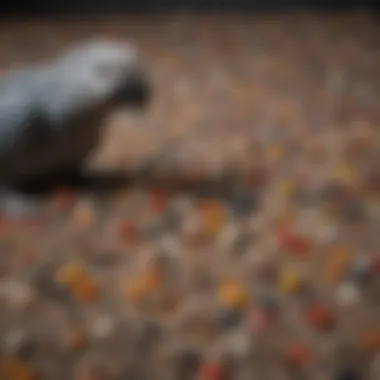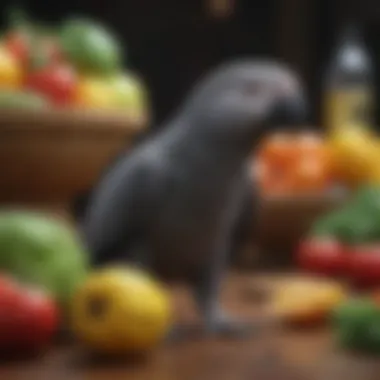African Gray Parrot Diet: Essential Nutritional Guide


Intro
The African Gray Parrot is known as one of the most intelligent and social birds. Understanding their diet is vital for their health. This section will highlight key dietary components necessary for African Gray Parrots and provide insights to ensure they thrive in a domestic environment.
Nutritional Needs of African Gray Parrots
An appropriate diet for an African Gray Parrot must include balanced nutrition. Such a diet is rich in vitamins, minerals, and proteins. Their primary food should be high-quality pellets specifically designed for parrots. These pellets contain essential nutrients that might be missing in seed diets.
Essential Nutrients
When crafting a diet for these birds, it is crucial to include the following:
- Proteins: These are vital for muscle health and overall growth. Sources can include cooked legumes, nuts, and seeds.
- Vitamins: Fruits and vegetables are essential to provide vitamins A, C, and E. Examples are carrots, spinach, and blueberries.
- Minerals: Calcium and phosphorus are necessary for strong bones. Leafy greens and cuttlebone can help achieve a balanced intake.
Providing a varied diet is more than just a matter of preference; it ensures that African Gray Parrots receive all the micronutrients they need to thrive.
Ideal Food Sources
In addition to pellets, consider including these foods:
- Fresh fruits such as slices of apple, oranges, and bananas.
- Vegetables including bell peppers, broccoli, and sweet potatoes.
- Nuts as a treat, but moderation is key due to high-fat content.
Common Dietary Pitfalls
Avoid feeding these birds unhealthy options like:
- Avocados: Toxic and harmful to birds.
- Chocolate: Can be lethal.
- Caffeine: Should be strictly avoided.
Ensuring a healthy diet prevents obesity and other related health issues. It is important to monitor food intake and adjust portions accordingly.
Finale
In summary, understanding the dietary needs of African Gray Parrots is essential for their well-being and longevity. A varied diet rich in essential nutrients along with strong knowledge of proper feeding strategies can help ensure these remarkable birds lead healthy, happy lives.
Understanding the African Gray Parrot
Understanding the African Gray Parrot is crucial for anyone who wishes to provide proper care for these intelligent creatures. This section outlines the main physical characteristics and behavioral traits of this species. Knowledge of these elements can greatly affect how owners manage their dietary needs, social interactions, and overall well-being.
Physical Characteristics
The African Gray Parrot is well-known for its distinct appearance. It has a predominantly gray plumage, which is punctuated by flashes of red in the tail feathers. The beak is strong and curved, ideally suited for cracking nuts and seeds. Adult African Grays typically reach lengths of 12 to 14 inches. Their size can influence their dietary needs, as larger birds may require more food. The weight of these parrots generally ranges from 400 to 650 grams. They also possess a remarkable ability to mimic sounds, which adds a layer to their appeal as pets.
Beyond aesthetics, the physical attributes of African Gray Parrots, such as their dexterous feet, allow them to forage effectively. Understanding these traits aids in selecting appropriate toys and food types, thus contributing to an enriching environment.
Behavioral Traits
African Gray Parrots are recognized not just for their intelligence, but also for their complex behavioral patterns. These birds are highly social creatures, often forming strong bonds with their human caretakers. They thrive on interaction and require regular mental stimulation to remain healthy.
They exhibit curiosity and can display enjoy various activities, such as problem-solving and play. For owners, fostering a stimulating environment is important to tap into these behaviors. Additionally, they can become bored or anxious if not engaged adequately, which may lead to behavioral issues.
Ultimately, comprehending the behavioral traits of African Gray Parrots informs owners about the importance of a diverse diet and proper socialization. Understanding both their physical and behavioral characteristics is imperative for ensuring their health and emotional stability.
Importance of a Balanced Diet
A balanced diet is crucial for the well-being of African Gray Parrots. These birds are not only famous for their incredible intelligence but also for their specific dietary requirements. Feeding them an appropriate diet can significantly affect their health, behavior, and longevity. An unbalanced diet may lead to health issues, such as obesity, malnutrition, or various diseases. Hence, understanding the importance of a balanced diet is essential.


Nutritional Needs
Macronutrients
Macronutrients include proteins, fats, and carbohydrates. These are essential for providing energy and supporting various bodily functions. For African Gray Parrots, the right mixture of macronutrients helps maintain muscle mass and proper metabolic rate.
- Proteins are vital for growth and repair of tissues as well as enzymes, hormones, and immune functions. Without enough protein, the bird may suffer from weakened immune responses.
- Fats serve as a concentrated energy source and also assist in the absorption of certain vitamins. However, excessive fat can lead to obesity.
- Carbohydrates provide a quick source of energy but should be present in moderation.
These macronutrient groups are critical because they directly influence the health and vitality of the parrot.
Micronutrients
Micronutrients consist of vitamins and minerals. Though required in smaller amounts compared to macronutrients, they are equally important in an African Gray Parrot's diet. Micronutrients help in various processes of growth, metabolism, and overall health maintenance.
- Vitamins like A, D, E, and K, as well as B-complex, play pivotal roles in various bodily functions, including vision and immune health.
- Minerals such as calcium, phosphorus, and potassium are involved in bone health, nerve function, and muscle contraction.
Providing adequate micronutrients ensures that these birds develop properly and remain healthy.
Impact on Health
Physical Health
The physical health of African Gray Parrots heavily depends on a balanced diet. Proper nutrition aids in maintaining a strong immune system, ensuring optimal organ functions and overall vitality. For instance, a diet lacking necessary vitamins and minerals can lead to serious conditions, such as feather plucking or systemic diseases. Also, a strong diet discourages obesity, which can shorten life expectancy.
Mental Health
Mental health is as vital as physical health for African Gray Parrots. A well-balanced diet contributes to cognitive functions, which affect their behavior and interaction. Parrots that receive the right nutritional elements tend to be more active, exhibit less stress, and show fewer signs of boredom. Feeding a diverse diet can stimulate their natural foraging instincts, which is essential for mental enrichment.
Healthy nutrition directly influences not just physical health, but also mental well-being in African Gray Parrots.
In summary, the significance of a balanced diet cannot be overstated. It impacts every aspect of the African Gray Parrot's health—from physical strength to mental resilience.
Essential Components of the African Gray Parrot Diet
The diet of African Gray Parrots is essential for their overall health and well-being. These birds require a balanced intake of nutrients to thrive. The components of their diet significantly influence their physical condition and longevity. It is crucial to strike a balance between different food sources to meet their unique nutritional needs. Understanding the essential components is the first step in crafting an optimal feeding regimen.
Seeds and Pellets
Quality Seed Mixes
Quality seed mixes can play a central role in the diet of African Gray Parrots. They are often formulated specifically to provide a good balance of essential fatty acids, protein, and carbohydrates. A key characteristic of these mixes is the inclusion of various seeds, such as sunflower, millet, and safflower. This variation ensures that the birds receive a diverse range of nutrients. However, not all quality seed mixes are created equal. Some might contain additives that are not ideal for these birds. Therefore, selecting a reputable brand is essential. Well-balanced seed mixes can offer the benefits of both taste and nutrition, encouraging splendid feeding habits in your parrot.
Commercial Pellets
Commercial pellets are another significant component of an African Gray Parrot's diet. They are designed to provide complete nutrition. The key characteristic of commercial pellets is that they are made with a specific formula that includes all the necessary vitamins and minerals. They can reduce the chance of deficiency diseases. One unique feature of pellets is their uniform size, which helps with portion control. However, some parrots may not readily accept pellets at first. Therefore, it may require mixing pellets with seeds or fruits to encourage acceptance.
Fruits and Vegetables
Recommended Options
Fruits and vegetables are vital for a well-rounded diet. They provide essential vitamins, minerals, and fiber. Recommended options for African Gray Parrots include leafy greens like kale and dark leafy vegetables, along with fruits such as apples and berries. A standout characteristic of these foods is their freshness, which contributes to optimal nutrient absorption. Including a generous amount of fruits and vegetables enhances the variety in their diet, making feeding time both nutritious and stimulating. Additionally, fresh veggies can stimulate natural foraging behavior, which is important for mental health.
Avoiding Toxic Foods
Identifying and avoiding toxic foods is as crucial as offering recommended options. Certain foods can be harmful. For instance, avocados, chocolate, and caffeine should never be included in their diet. The key aspect of avoiding toxic foods is to educate pet owners on what can be harmful. This awareness protects the health of African Gray Parrots and prevents potential poisoning, which can be life-threatening. Ensuring that pet owners are informed and vigilant can promote the parrot's long-term wellness.


Nuts and Grains
Beneficial Nuts
Nuts can be an excellent addition to the diet of African Gray Parrots, providing essential fats and protein. Beneficial nuts include almonds and walnuts. Their high-fat content gives energy, which is very necessary for these active birds. The diversity of textures and tastes also makes them appealing. However, portion control is essential, as nuts are calorically dense, and overeating can lead to obesity. Always opt for unsalted and unseasoned nuts to ensure they are healthy choices for your parrot.
Grain Inclusion
Grains can contribute significantly to an African Gray Parrot's diet. Including grains, such as quinoa and brown rice, adds fiber and aids in digestion. The key characteristic of grains is their bulk, which can help prevent gastrointestinal issues. While grains are generally healthy, balance is crucial. They should not overshadow other essential components. Moderation and variety are vital in ensuring a well-rounded diet that meets the needs of the bird. By understanding these components, pet owners can create a favorable environment for their pet's health.
Feeding Guidelines
Feeding guidelines are crucial in ensuring that African Gray Parrots receive a balanced diet suitable for their needs. These guidelines help owners structure daily feeding habits, control portion sizes, and optimize the overall diet of these intelligent birds. A well-implemented feeding routine leads to better health, improved mood, and enhanced lifespan of the parrot. It’s essential to create a regime that satisfies their nutritional requirements while also catering to individual preferences.
Daily Feeding Routine
The daily feeding routine for African Gray Parrots is fundamental to maintaining their health and well-being. Establishing a consistent feeding schedule allows the parrot to anticipate meal times, which can reduce stress and anxiety.
- Timing: Feed your parrot twice a day, ideally in the morning and late afternoon. This routine aligns with their natural behavior, as they are most active during these times.
- Fresh Food: Always provide fresh fruits and vegetables daily. Leafy greens like spinach, peppers, and carrots are excellent choices.
- Seeds and Pellets: Introduce a mix of high-quality seeds and commercially available pellets. This combination helps deliver a variety of nutrients while preventing over-reliance on seeds alone.
- Monitoring Consumption: Observe how much food your parrot consumes daily. Adjust based on their activity level and preferences.
The focus should not only be on the quantity of food but also on its quality.
A balanced diet is the cornerstone of a healthy life for your African Gray Parrot.
Portion Control
Portion control is significant when it comes to feeding African Gray Parrots. Proper portioning aids in preventing obesity, which is a common issue among companion birds. Here are some important tips for portion control:
- Assess Activity Level: Daily activity greatly affects how much food your parrot needs. More active birds require more food than those that are less active.
- Serving Size: A good starting point for serving size is around 1/4 cup of pellets or seeds combined per feeding. Around 50% should be fresh fruits and vegetables.
- Adjust and Observe: Be prepared to modify portions based on your parrot’s health or weight changes. Regular monitoring helps identify any adjustments that may be necessary.
- Avoid Free Feeding: Do not leave food in the cage all day. This practice promotes unhealthy eating habits and can lead to obesity.
By adhering to these guidelines, you can ensure that your African Gray Parrot thrives physically and mentally, promoting a longer and healthier life.
Common Dietary Pitfalls
Understanding the dietary pitfalls for African Gray Parrots is essential for maintaining their health and well-being. Being aware of these common mistakes can help pet owners make informed decisions about their birds' diets. Addressing these issues is crucial as it can prevent health problems and enhance the overall quality of life for these intelligent creatures.
Over-reliance on Seeds
Seeds are often favored by many bird owners because they are readily available. However, an excessive reliance on seeds in the African Gray Parrot diet can lead to nutritional imbalances. Seeds typically lack several important vitamins and minerals. While sunflower seeds and safflower seeds are popular, they are high in fat and should not make up the majority of the diet.
Pet owners should limit seed intake to promote a more varied diet. A mix of high-quality pellets, fruits, and vegetables provides better nutritional balance. This approach not only supports physical health but also fosters mental stimulation. The African Gray Parrot enjoys foraging, and a diverse diet allows it to engage in this natural behavior.
Lack of Variety
A lack of variety in the diet can be detrimental. African Gray Parrots thrive on a mix of foods, including vegetables, fruits, and grains. Many owners may stick to familiar foods, but this can lead to nutrient deficiencies. Different foods provide various vitamins and minerals necessary for health.
Research indicates that feeding a diverse diet can help prevent behavioral issues and encourage natural foraging behavior. Incorporating new foods weekly can introduce not just nutrients but also excitement into their feeding routine.
To enhance variety, consider rotating different vegetables and fruits, such as carrots, spinach, and apples. Offer grains like quinoa and brown rice as well. Each new food can serve as an opportunity to observe how the bird reacts, contributing to a more engaging feeding experience.
Inadequate Calcium Intake
Calcium is vital for an African Gray Parrot's bone health and overall function. Insufficient calcium levels can lead to serious health issues, including feather plucking and other behavioral issues. This mineral plays a key role in muscle function, nerve signaling, and blood clotting.
It is important to provide calcium-rich foods such as dark leafy greens, almonds, and fortified pellets. Moreover, offering cuttlebone or mineral blocks can also aid in meeting their calcium requirements. Monitor calcium intake closely, especially in breeding and aging birds, as their needs may vary significantly.


Adequate calcium is critical for preventing health issues in African Gray Parrots. Always strive to integrate calcium-rich foods into their diet.
Hydration for African Gray Parrots
Importance of Water
Hydration is critical for all living beings, including the African Gray Parrot. Water aids various essential bodily functions, such as digestion, circulation, and temperature regulation. An adequately hydrated parrot has better skin health, feather condition, and overall vitality. Dehydration can lead to serious health issues, including organ damage, lethargy, and even death in severe cases.
African Gray Parrots may not drink a large quantity of water, but they need access to fresh, clean water at all times. In nature, these birds consume water from various sources. It is vital for owners to understand that the need for hydration goes beyond just filling a bowl. The quality and condition of water directly affect the bird’s health.
It’s also important to note that many fruits and vegetables can contribute to a parrot's hydration. However, relying solely on these methods is insufficient; they cannot replace the need for direct water intake.
Offering Fresh Water
Providing fresh water is essential to ensure the health of African Gray Parrots. Pet owners should change the water daily. Stagnant water or water that has been contaminated from food debris can harbor bacteria, posing a risk to the parrot’s health.
Take these steps when offering water:
- Use a shallow dish: It allows parrots to drink comfortably without risk of drowning.
- Avoid metal containers: Some metals may harm birds when ingested. Use ceramic or glass instead.
- Monitor water intake: Observing how much water your parrot drinks daily can help identify any potential health issues early.
- Clean the water bowl regularly: Sanitizing the bowl is essential to prevent bacterial growth.
By paying attention to these factors, pet owners contribute significantly to the well-being of their African Gray Parrots, ensuring they remain hydrated and healthy.
Monitoring and Adjusting the Diet
Maintaining an optimal diet for African Gray Parrots is not a static process. It is essential for pet owners to monitor and adjust the diet based on various factors such as individual needs, health status, and life stage. By doing so, owners can ensure their parrots thrive both physically and mentally. A consistent examination of dietary habits leads to a better understanding of how each bird’s needs vary.
Observing Behavior and Health
Behavior is often the first indicator of a change in health or satisfaction with the diet. African Gray Parrots are known for their intelligence and vocalizations. If a bird suddenly becomes quieter, more withdrawn, or changes its eating habits, these may be signs of distress or dietary deficiency. Monitoring their activity levels and social behaviors is crucial. It is also essential to be aware of their droppings; abnormal fecal output can indicate dietary issues that need attention.
Additionally, incorporating a ledger to track daily food intake and behavioral observations can provide a clearer picture of the parrot’s overall health. Common indicators to watch for include weight fluctuations, feather condition, and skin health.
Consider maintaining a daily journal that records:
- Amount of food consumed
- Types of food offered
- Any noticeable changes in behavior or physical condition
This information can help in identifying patterns, making it easier to adjust diets to maintain optimal health.
Regular Vet Consultations
Regular veterinarian consultations are paramount for monitoring the overall health, including diet, of African Gray Parrots. Experts recommend that pet owners engage in wellness checks at least once a year or sooner if any health concerns arise.
During these appointments, vets can evaluate the bird's body condition score and nutritional needs. They often provide insights into the right balance of seeds, nuts, fruits, and vegetables based on the individual bird's lifestyle and health condition. Lab tests may also be conducted to check for any nutrient deficiencies or imbalances that could be affecting the parrot's health.
Furthermore, feedback from a veterinarian can guide modifications to the diet—recommendations might include:
- Adjusting calcium or vitamin intake
- Introducing new food options to enhance variety
- Identifying any problematic ingredients that might provoke allergies or sensitivities
In summary, monitoring behavior and organizing regular vet consultations are essential strategies in effectively managing an African Gray Parrot’s diet. Together, these practices help ensure a well-rounded and nutritionally sufficient feeding regimen, ultimately contributing to a happier, healthier bird.
End
The conclusion of this article is vital for understanding the overall significance of a proper diet for African Gray Parrots. It encapsulates the essential information discussed and reinforces the benefits of maintaining a well-balanced nutritional routine. A careful approach to their diet plays a crucial role in promoting longevity and well-being. By addressing their specific dietary requirements, pet owners can help their parrots achieve optimal health, both physically and mentally.
Summary of Key Points
A balanced diet is essential for the health of African Gray Parrots. Key dietary components include seeds, fruits, vegetables, nuts, and grains. Regular monitoring and adaptation of the diet are necessary based on health observations. Hydration is equally important, emphasizing the need for fresh water. Avoid common pitfalls such as over-reliance on seeds and lack of variety.
Final Recommendations
Provide a varied diet, aiming for at least 50% fresh fruits and vegetables. Invest in high-quality pellets and seed mixes designed specifically for African Gray Parrots. Regularly observe your parrot's behavior and health to make dietary adjustments. Consult with an avian vet periodically to ensure nutritional needs are being met. Stay informed about safe and toxic food options to prevent health issues.
Remember, a well-considered diet reflects the love and care you have for your African Gray Parrot.







